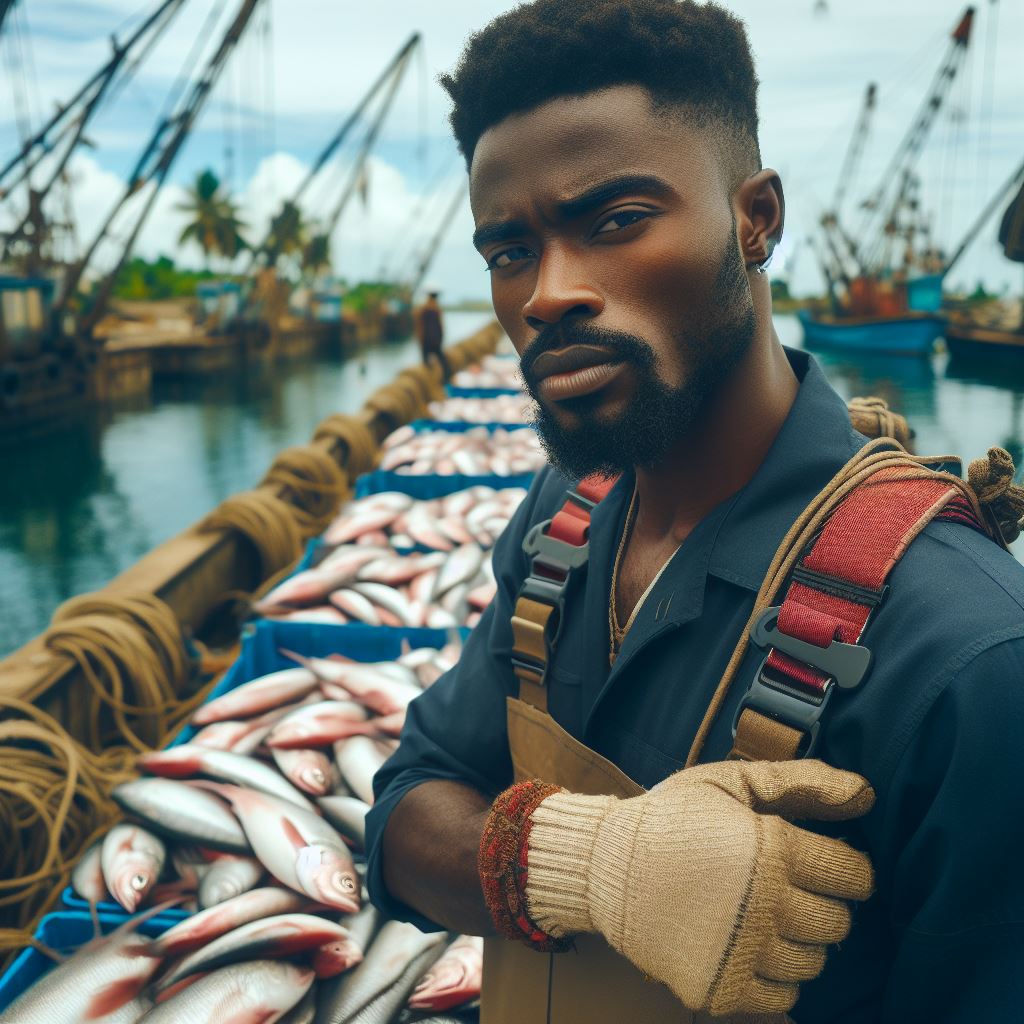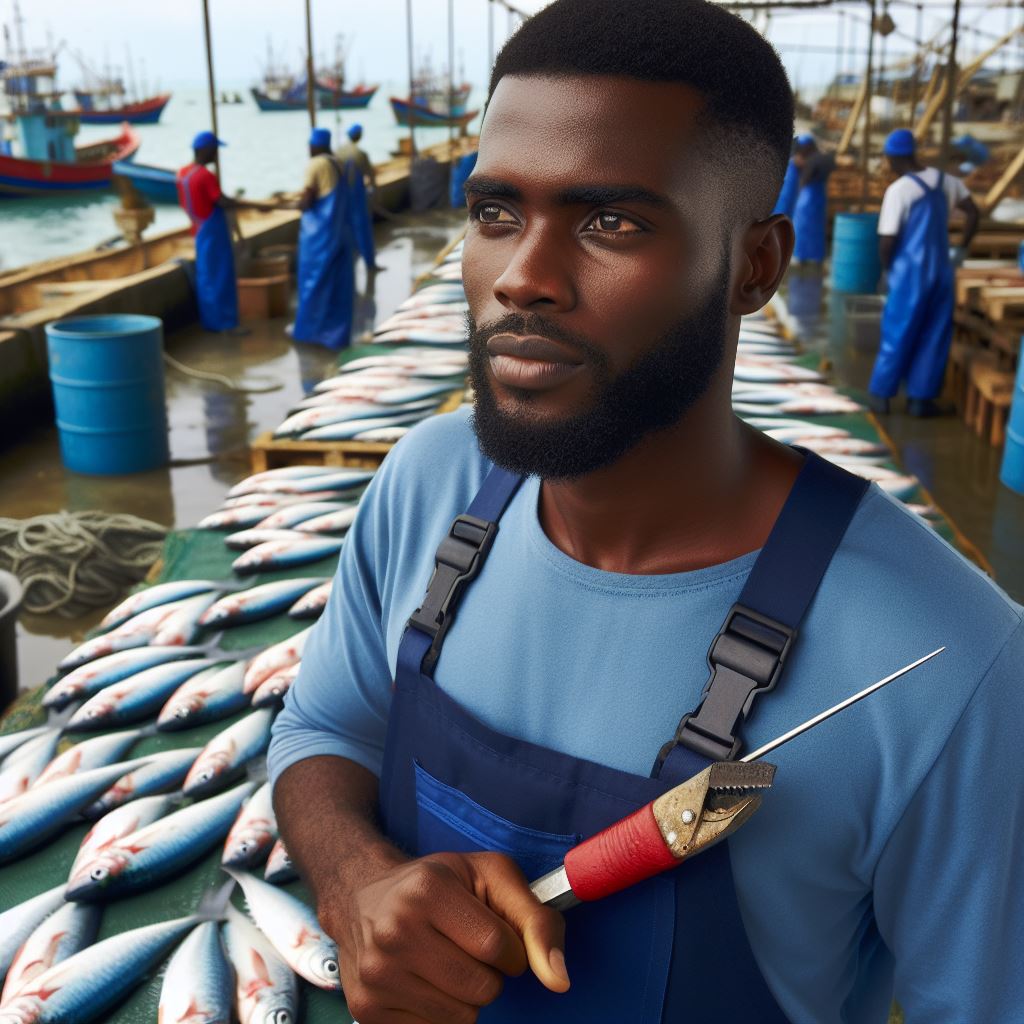Introduction
Nigeria offers several career opportunities after fisheries education, vital for the fishing industry’s growth and sustainable development.
Fisheries education plays a crucial role in improving the fishing industry and ensuring sustainable development in Nigeria.
The fishing industry needs skilled professionals to manage resources responsibly.
Fisheries graduates can navigate government agencies, oversee fish processing and marketing, or even advocate for sustainable fishing practices. And with growing awareness of aquaculture’s potential, career paths in fish farming, breeding, and disease management are flourishing.
But fisheries education extends beyond the industry. Research institutions, environmental NGOs, and international organizations welcome graduates with open arms.
You could be studying climate change impacts on fish populations, developing innovative fishing gear, or even educating communities on sustainable fishing practices.
So, if a career filled with purpose, adventure, and the chance to safeguard Nigeria’s aquatic riches excites you, cast your educational net wide. Fisheries education equips you with the knowledge and skills to navigate a diverse career ocean, ensuring a sustainable future for both fish and people.
Overview of Fisheries Education in Nigeria
In Nigeria, fisheries education plays a vital role in the development of the fishing industry.
It equips individuals with the knowledge and skills necessary for careers in fishery management, aquaculture, and marine sciences.
Types of Institutions Offering Fisheries Education
Universities
Many universities in Nigeria offer fisheries education programs. These institutions provide comprehensive theoretical and practical training.
Polytechnics
Some polytechnics also provide fisheries education, focusing on the practical aspects of the field.
Vocational Schools
Vocational schools offer short-term courses in fisheries education, targeting individuals interested in specific skills like fish processing or fish farm management.
Curriculum and Areas of Specialization within Fisheries Education
The curriculum in fisheries education covers a wide range of subjects to provide students with a holistic understanding of the field. Some areas of specialization include:
Marine Biology
Students study the biology and ecology of marine organisms, including fish species, their habitats, and conservation strategies.
Aquaculture
This specialization focuses on fish farming techniques, including breeding, nutrition, disease control, and sustainable aquaculture practices.
Fisheries Management
Students learn about resource management, regulations, and policies aimed at maintaining sustainable fish stocks and preventing overfishing.
Fish Processing and Preservation
This specialization teaches students various techniques for processing fish, including smoking, drying, canning, and freezing.
Marine Engineering
Students learn about the design, construction, and maintenance of equipment used in fishing vessels and aquaculture facilities.
Research and Development
Students interested in research careers in fisheries can focus on data collection and analysis, fisheries monitoring, and developing innovative fishing techniques.
Upon completing their fisheries education, graduates in Nigeria have various career opportunities.
Government Fisheries Agencies
Graduates can work for government agencies responsible for fisheries management, policy-making, and regulation enforcement.
Fisheries Research Institutes
Research institutes employ qualified individuals to conduct scientific research leading to advancements in fishery management.
Fish Farming and Aquaculture Enterprises
Graduates can start their own fish farms or work in aquaculture enterprises involved in breeding, rearing, and selling fish.
Seafood Processing Industries
Career opportunities exist in the seafood processing industry, where graduates can work in fish processing plants and contribute to value addition.
Conservation Organizations
Graduates can join conservation organizations that focus on protecting fish habitats, biodiversity, and promoting sustainable fishing practices.
Academic and Research Institutions
Some graduates choose to pursue further education and research careers by working in universities or research institutions.
International Organizations
Opportunities also exist to work with international organizations such as the Food and Agriculture Organization (FAO) on fisheries-related projects.
In fact, a fisheries education in Nigeria opens up a wide range of rewarding career opportunities.
It equips individuals with the necessary skills and knowledge to contribute to the sustainable development of the fishing industry and the conservation of aquatic resources.
Read: Job Market Analysis: Environmental Management in Nigeria

Skills and Knowledge Acquired
Fisheries education in Nigeria equips students with a diverse set of skills crucial for thriving in the dynamic aquatic industry.
Firstly, students grasp a comprehensive understanding of fishery management.
This involves learning to balance ecological factors, sustainable harvesting, and the economic aspects of fisheries.
The skills and knowledge that students acquire through fisheries education
Acquiring expertise in aquatic ecology is paramount. Students delve into the intricate relationships within aquatic ecosystems, understanding the delicate balance necessary for preserving biodiversity.
This knowledge is foundational for responsible fisheries management.
Hands-on training forms a cornerstone, providing practical experiences essential for success in the field.
Internships immerse students in real-world scenarios, enhancing problem-solving abilities and adaptability.
Fieldwork offers exposure to diverse aquatic environments, fostering adaptability and resourcefulness.
Research skills are honed through meticulous studies, empowering students to contribute to advancements in fishery science.
They learn to design and execute experiments, enhancing critical thinking and analytical capabilities.
Transform Your Career with Expert Guidance
Get personalized mentorship consulting that’s tailored to your unique path. Our expert advice is actionable and exclusive.
Get StartedThis proficiency is invaluable for addressing contemporary challenges in the fisheries sector.
Fish processing expertise is another key component.
From handling to preservation techniques, students become adept at ensuring the quality and safety of fish products.
This knowledge is vital for meeting market standards and consumer expectations.
The practical experiences gained through internships, fieldwork, and research
The aquaculture dimension emphasizes sustainable fish farming methods.
Students gain insights into breeding, nutrition, and disease management, fostering innovation in this rapidly evolving sector.
This practical knowledge is essential for those aspiring to be successful aquaculturists.
The importance of hands-on training in fishery management, aquatic ecology, fish processing, and aquaculture
In short, fisheries education in Nigeria molds students into well-rounded professionals.
Armed with a solid foundation in fishery management, aquatic ecology, fish processing, and aquaculture, graduates are poised for a myriad of career opportunities in the thriving Nigerian fisheries industry.
The hands-on training ensures that they enter the workforce equipped with the practical skills demanded by this dynamic field.
Read: Nigerian Research Highlights in Environmental Toxicology
Job Market and Future Trends
The current job market for fisheries education graduates in Nigeria
In Nigeria, the job market for fisheries education graduates is quite promising and diverse.
There is a significant demand for professionals in various sectors of the fishing industry.
Graduates can find employment opportunities in government agencies, research institutions, and private companies.
With a growing population and increasing focus on food security, the need for skilled fisheries experts is on the rise.
Nigeria has a vast coastline and numerous rivers, providing ample opportunities for fisheries-related jobs.
The government’s emphasis on the agricultural sector also contributes to the availability of jobs in fisheries.
The job market for fisheries education graduates in Nigeria offers a range of prospects.
The demand for professionals in the field and the salary prospects
The demand for fisheries professionals in Nigeria is high due to the country’s reliance on the fishing industry.
Skilled individuals are needed to manage fisheries resources, conduct research, and ensure sustainable practices.
Salaries for fisheries education graduates vary depending on the job role, experience, and level of responsibility.
Entry-level positions may offer salaries ranging from ₦500,000 to ₦1,000,000 per annum.
With experience and expertise, professionals can earn salaries exceeding ₦2,000,000 per annum.
Higher positions in government agencies or managerial roles in private companies also come with attractive salary packages.
The demand for fisheries professionals in Nigeria presents promising salary prospects for graduates.
The emerging trends in the fishing industry, such as sustainable fisheries, fishery management, and aquaculture
The fishing industry in Nigeria is witnessing several emerging trends that offer exciting career opportunities.
Sustainable fisheries practices are gaining importance to ensure the long-term viability of fish stocks.
Fishery management, including regulations and conservation efforts, is becoming a key focus.
Ensuring the responsible and sustainable use of aquatic resources requires skilled professionals.
Aquaculture, the farming of fish and other aquatic organisms, is also growing rapidly in Nigeria.
This sector presents numerous prospects for fisheries education graduates.
From managing fish farms to developing new and innovative aquaculture techniques, the possibilities are vast.
Moreover, the increased demand for fish and seafood globally opens avenues for export and international trade.
As the fishing industry continues to evolve, professionals with a strong foundation in fisheries education will be in high demand.
By staying updated with emerging trends and expanding their skill sets, graduates can secure rewarding careers in the field.
In essence, fisheries education graduates in Nigeria have a promising job market and future prospects.
The demand for professionals in the field is high, thanks to the country’s reliance on the fishing industry.
Salary prospects are attractive, especially with experience and advancement in the field.
Emerging trends such as sustainable fisheries, fishery management, and aquaculture offer exciting career opportunities.
By capitalizing on these trends, graduates can pave the way for a successful and fulfilling career in the fisheries industry.
Read: Scholarships & Grants for Toxicology Students in Nigeria
Success Stories and Case Studies
In the vast ocean of career opportunities, pursuing fisheries education in Nigeria opens doors to a realm of possibilities that extend far beyond the shores.
This section delves into the inspiring success stories and illuminating case studies of individuals who have not only navigated the waves of fisheries education but have also made significant contributions to the growth and development of the Nigerian fisheries industry.
Success stories of individuals who pursued successful careers after fisheries education
- Dr. Amina Abdullahi: A trailblazer in fisheries research, Dr. Abdullahi’s journey began with a passion for sustainable fishing practices. Armed with a degree in Fisheries and Aquaculture, she embarked on groundbreaking research projects, ultimately earning her a Ph.D. in Marine Biology.
Dr. Abdullahi’s work has been instrumental in shaping policies for responsible fisheries management, earning her accolades both nationally and internationally. - Emeka Okeke – Aquaculture Entrepreneur: After completing his fisheries education, Okeke ventured into aquaculture entrepreneurship. His fish farming enterprise not only met the growing demand for fish but also created job opportunities in rural communities.
Today, Okeke is recognized for his innovative approach to sustainable aquaculture, promoting economic growth and food security.
Case studies of notable professionals in the Nigerian fisheries industry
- Chief Funmilayo Adekunle – Fisheries Policy Advocate: Adekunle’s fisheries education paved the way for a career in policy advocacy. As a prominent figure in the Nigerian fisheries industry, she played a pivotal role in the development of policies promoting responsible fishing practices and environmental conservation.
Her efforts have contributed to the sustainable growth of the industry. - Engr. Ahmed Musa – Fisheries Infrastructure Development: Musa, armed with a degree in Fisheries Engineering, has been at the forefront of developing crucial infrastructure for the fisheries sector.
His expertise in designing and implementing fish processing plants has enhanced the efficiency of the industry, reducing post-harvest losses and ensuring product quality.
Their achievements, contributions, and the impact they have made in their respective fields
These success stories and case studies exemplify the diverse career opportunities available after pursuing fisheries education in Nigeria.
From research and entrepreneurship to policy advocacy and infrastructure development, individuals in the field have not only found success but have also played a vital role in shaping the future of the Nigerian fisheries industry.
Aspiring professionals in fisheries education have a vast ocean of possibilities awaiting them, where their knowledge and passion can make a lasting impact.
Read: The Evolution of Environmental Studies in Nigeria
Conclusion
Fisheries education in Nigeria offers a wide range of potential career opportunities for graduates.
These include positions such as fishery managers, aquaculture technicians, marine biologists, seafood processors, and fishery consultants.
The importance of fisheries education cannot be overstated in driving sustainable development and economic growth in the fishing industry.
With proper training and knowledge, graduates can contribute to the conservation of fish populations, the improvement of fishing techniques, and the enhancement of aquaculture practices.
Aspiring students should consider fisheries education as a viable career option, as it not only offers job security but also allows them to make a positive impact on the environment and contribute to the economic growth of Nigeria.
By pursuing a career in fisheries, individuals can play a crucial role in ensuring the sustainable use of aquatic resources and addressing food security challenges in the country.
In the end, fisheries education in Nigeria opens the doors to various exciting career prospects.
It is a field that can drive sustainable development, protect the environment, and contribute to economic growth.
So, if you are passionate about fisheries and want a fulfilling career, consider fisheries education as your path to success.




